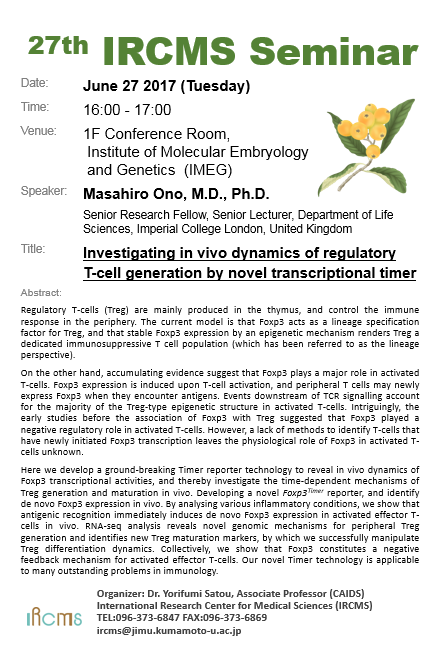- HOME
- IRCMS Seminars
- 27th IRCMS Seminar
IRCMS Seminars
27th IRCMS Seminar
June 27 2017
We had a large number of participants come to the 27th IRCMS seminar held on June 27, for which we would like to express our gratitude.
Date: June 27, 2017 (Tue) Time: 16:00 - 17:00
Venue: 1F Conference Room, Institute of Molecular Embryology and Genetics (IMEG)
Speaker: Masahiro Ono M.D., Ph.D.
Senior Research Fellow, Senior Lecturer, Department of Life Sciences, Imperial College London, United Kingdom
"Investigating in vivo dynamics of regulatory T-cell generation by novel transcriptional timer"
Regulatory T-cells (Treg) are mainly produced in the thymus, and control the immune response in the periphery. The current model is that Foxp3 acts as a lineage specification factor for Treg, and that stable Foxp3 expression by an epigenetic mechanism renders Treg a dedicated immunosuppressive T cell population (which has been referred to as the lineage perspective).
On the other hand, accumulating evidence suggest that Foxp3 plays a major role in activated T-cells. Foxp3 expression is induced upon T-cell activation, and peripheral T cells may newly express Foxp3 when they encounter antigens. Events downstream of TCR signalling account for the majority of the Treg-type epigenetic structure in activated T-cells. Intriguingly, the early studies before the association of Foxp3 with Treg suggested that Foxp3 played a negative regulatory role in activated T-cells. However, a lack of methods to identify T-cells that have newly initiated Foxp3 transcription leaves the physiological role of Foxp3 in activated T-cells unknown.
Here we develop a ground-breaking Timer reporter technology to reveal in vivo dynamics of Foxp3 transcriptional activities, and thereby investigate the time-dependent mechanisms of Treg generation and maturation in vivo. Developing a novel Foxp3Timer reporter, and identify de novo Foxp3 expression in vivo. By analysing various inflammatory conditions, we show that antigenic recognition immediately induces de novo Foxp3 expression in activated effector T-cells in vivo. RNA-seq analysis reveals novel genomic mechanisms for peripheral Treg generation and identifies new Treg maturation markers, by which we successfully manipulate Treg differentiation dynamics. Collectively, we show that Foxp3 constitutes a negative feedback mechanism for activated effector T-cells. Our novel Timer technology is applicable to many outstanding problems in immunology.
Reference
1. Bending, D. et al. Submitted.
2. Fujii, H., Josse, J., Tanioka, M., Miyachi, Y., Husson, F., and Ono, M. (2016). Regulatory T Cells in
Melanoma Revisited by a Computational Clustering of FOXP3+ T Cell Subpopulations. J Immunol. 196 (6),
2885-92.
3. Ono, M. & Tanaka, R.J. (2016) Controversies concerning thymus-derived regulatory T cells: fundamental
issues and a new perspective. Immunol Cell Biol. Jan;94(1):3-10. doi: 10.1038/icb.2015.65.
4. Ono, M., Yaguchi, H., Ohkura, N., Kitabayashi, I., Nagamura, Y., Nomura, T., Miyachi, Y., Tsukada, T. and
Sakaguchi, S. (2007) Foxp3 controls regulatory T-cell function by interacting with AML1/Runx1. Nature,
446: 685-689.
Organizer: Dr. Yorifumi Satou, Associate Professor (CAIDS)

